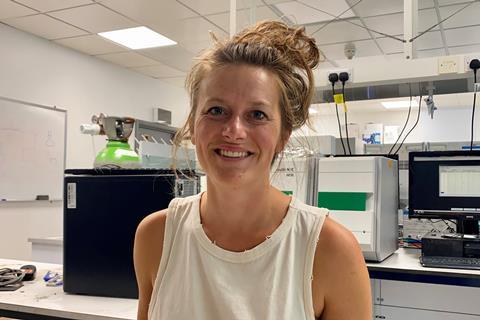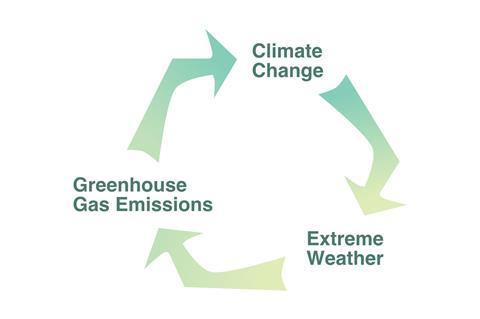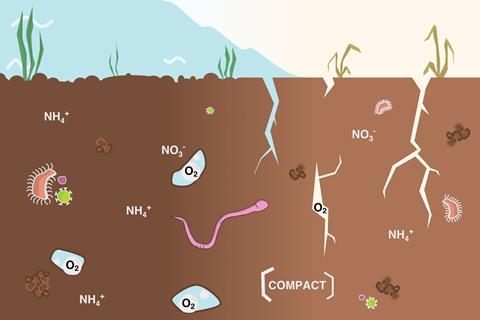Emma investigates the link between climate change and increased greenhouse gas emissions from the soil
Mae’r proffil hon ar gael yn Gymraeg
Dilynwch i gael y fersiwn Gymraeg
Hi, I’m Emma and I work as a soil scientist at Bangor University.



What does a soil scientist do?
My research looks at the impact of extreme weather on the soil and how this affects the environment for humans. Extreme weather events such as droughts and floods are becoming more common due to climate change. Unfortunately, floods can cause soils to emit a greenhouse gas called nitrous oxide, which then contributes towards more climate change – this is a positive feedback loop. We are starting to realise that, when droughts and floods happen straight after each other, it can cause even more nitrous oxide to be released into the atmosphere.
In my research, I am looking at different types of droughts and floods to see which combinations result in more greenhouse gas emissions. I am also trying to work out why this is happening so that we can make a plan to prevent it.
How does your work affect the world around us?
My research teaches us a bit more about why and how greenhouse gases are emitted from our soils in a changing climate. Hopefully, my results will feed into legislation and advice for landowners to help them manage their land in a way that produces less greenhouse gases, contributing less towards climate change.
Salary range and qualifications required
- Salary range: As a PhD student, you earn about £16,000 per year. If you work your way up, the average professor in the UK earns £90,000 per year (and some earn much more!).
- Minimum qualifications: There are two routes to working in science at a university. One way is to apply for a scientific degree, apply for a PhD afterwards and then to get a job as a researcher if you pass your assessments (you will usually need to achieve a 2.1 in your degree to be accepted onto a PhD programme).
- The other method is to apply for a job as a technician in a university laboratory. Technician roles vary – for some, you need GCSEs, whereas others require a degree or PhD. Usually, the higher your qualifications, the more you will get paid.
What is your typical day like?
My days are really varied! I spend some of my time out on the university farm digging up, sieving and weighing soils. I also do a lot of labwork, using techniques like gas chromatography to measure greenhouse gases and spectrophotometry (which measures light absorption) for analysing things like nitrate and ammonium in the soil.
When I’m not doing practical work, I spend time at my desk reading other people’s research to make sure my experiments aren’t just repeating things that have already been done. I also do lots of data analysis and write up my results into scientific papers so that other scientists can read and learn from my work.
Why did you choose chemistry? What keeps you motivated?
I didn’t really choose chemistry – my degree was in biochemistry and I wanted to use my biochemistry to help understand how we can keep the planet healthy enough for human life to continue surviving on it. This led me to soil science, and it just so happens that soil science also involves a lot of chemistry. The longer I work at Bangor University, the more chemistry I end up using.
What do you like most about your job?
The best bit of my job is when I’ve spent weeks planning and running an experiment and I finally start to get data that lets me answer questions that no one has ever been able to answer before.
What skills do you need for your job?
The main challenge of working in scientific research at a university is that you need to be able to self-motivate. Often, you will have to set your own targets and deadlines, which requires strict time management but gets easier as you get used to it. Working in science will teach you good problem-solving, data-handing and technical skills. You’ll also get lots of opportunities to communicate your science, work on your own and also as part of a larger team. There are always training courses to go on if there is something new you want to learn, or something you feel is holding you back.
How did you find your job? How did your qualification help you to get there?
I worked in my research group as part of my master’s degree in conservation and land management. I enjoyed the working environment and specialism so much that I applied for a PhD with them as well.
My job required me to have a university degree in a related subject. Having a master’s degree also really helped.
During my qualification, I learned to feel comfortable trying new things and using lots of different laboratory equipment. I also learned not to believe everything that I read and how to work out which sources are trustworthy.
What advice would you give to a young person considering a career in your field?
Question everything and don’t always assume that people “above” you know what they’re talking about!
What are your plans for the future?
At the moment, I’m enjoying working on my research but I also enjoy communicating science and working with the public. I’ve never liked planning too far ahead so I’ll just take the next good opportunity when it comes.
Want to know more?
- Explore your study options, talk to a career adviser and look into gaining work experience.
- You can find out about different universities online – they all have their own websites. If you decide on an area of study that suits you, try contacting some universities that specialise in that area. They should be able to offer you advice and support.
Emma Withers, soil scientist at Bangor University.
Hear from more chemical scientists in Wales
Discover profiles of other chemical scientists working in Wales, ranging from pollution control and pharmaceuticals to product development and more.
Published September 2022















